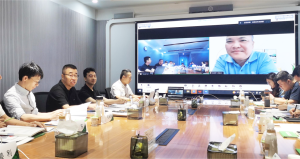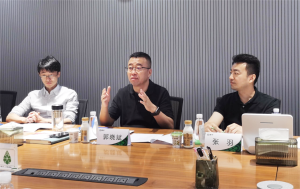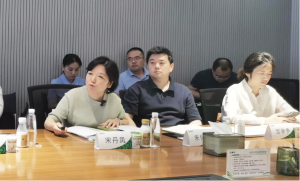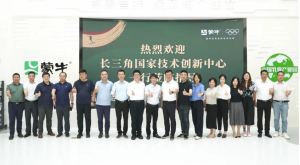On July 11, the Yangtze River Delta National Innovation Center organized multiple technical teams and representatives from joint innovation enterprises in related fields to visit Hohhot, the headquarters of China's leading dairy company, Mengniu Group. They engaged in in-depth exchanges and collaborations with Mengniu Group regarding the technological needs and development trends in synthetic biology and microecological health, aiming to promote the deep integration of industry, academia, and research.
Gu Yuandong stated that as a leading enterprise in China's dairy industry, Mengniu is an important partner of the Yangtze River Delta National Innovation Center.He expressed hope that through this event, the center would further meticulously explore more technological needs to better serve the company's development. He also hoped that both sides could establish a long-term trust relationship, deepen cooperation content, innovate collaboration models, and jointly create a model for innovative cooperation.

Guo Xiaobin warmly welcomed the Yangtze River Delta National Innovation Center and the various technical teams. He introduced Mengniu Group's development plans, strategic goals, and project deployments in Shanghai. He emphasized that Mengniu insists on independent R&D innovation, focusing on "dairy technology, nutritional health, and biotechnology" to build a research system and continuously promote the transformation and application of scientific research results. The Yangtze River Delta region, with Shanghai at its forefront, is rich in innovation resources and strong in innovation capabilities. Mengniu hopes to further strengthen cooperation with the Yangtze River Delta National Innovation Center, connect with more first-class innovation resources, and support the application of new technologies, processes, and the development of new products, jointly promoting the innovative development of China's dairy industry.

At the meeting, Wu Junwei introduced the overall functional positioning and resource advantages of the National Innovation Center, as well as the main features of the Pudong "Revealing the List and Taking Command" platform operated by the Shanghai Yangtze River Delta Institute, along with practical cases of promoting deep integration of industry, academia, and research. Tan Yibin outlined the center's overall layout in the biomedical field, stating that the center focuses on innovative drugs, medical devices, and bio-health, and is building a new highland for bio-manufacturing in the Yangtze River Delta region with synthetic biology at its core. He expressed hope to strengthen cooperation with Mengniu, introduce more domestic and international innovation resources, and jointly advance synthetic biology technology innovation and industrial application.


Mao Yuejian presented the R&D layout of Mengniu's Global R&D Innovation Center and its achievements in the fields of synthetic biology and microecological health. He highlighted Mengniu's specific R&D needs in areas such as new technologies (method development), new strains (probiotics), new raw materials (synthetic biology), new functions (clinical research), and new products (product development).He emphasized that the company's technological R&D focuses on creating a commercial closed loop. Mengniu, driven by industrial demands, is leading technological innovation and building a systematic, hierarchical, and globally integrated collaborative R&D system. By establishing a win-win model of internal and external cooperation, Mengniu aims to ensure the successful development of core technologies.

Both sides engaged in in-depth discussions on the development potential and future cooperation opportunities in the fields of synthetic biology and microecological health technology industries.Song Danfeng, CEO of Shanghai Synomebio; Wang Yaopeng from Antibocom; and Zhu Huaixu, Vice President of Weiji Health under Fosun Group, a joint innovation enterprise of the National Innovation Center, introduced their companies' profiles, R&D teams, technological achievements, and progress in R&D and industrialization. They also provided detailed insights into core technologies and solutions tailored to Mengniu's specific needs. After the meeting, the parties further discussed specific solutions in group sessions.

After the meeting, the delegation from the Yangtze River Delta National Innovation Center visited Mengniu's intelligent production workshop at its sixth-phase factory in Helingeer County. They gained an in-depth understanding of Mengniu's fully automated milk production process, from raw milk pretreatment to automatic filling and finished product palletizing.

Gu Yuandong stated that this event strengthened mutual understanding between both parties, further aligned and explored Mengniu's R&D and technological needs, and laid a solid foundation for cooperation. In the next step, the Yangtze River Delta National Innovation Center will organize teams to refine and summarize Mengniu's specific needs. Leveraging its rich innovation resources and comprehensive innovation system, the center will use the "Revealing the List and Taking Command" approach to match solutions to these needs, attract outstanding research teams to address corporate demands, and further promote the application of cutting-edge technologies in practical product development. This will accelerate the deep integration of the innovation and industrial chains, empower enterprises to improve quality and efficiency, create benchmark demonstration effects, and jointly drive the development of China's dairy industry.
Further Reading
Synomebio (Shanghai) Co., Ltd. specializes in the field of enzyme engineering, focusing on the development of biological enzymes for three major application scenarios: medical diagnostics, food consumption, and functional foods. The company boasts the most comprehensive recombinant expression technology platform (OmniProtein) in China, allowing flexible selection of optimal expression systems, and has achieved high-efficiency, low-cost industrial production. It has established a high-throughput screening and storage system to ensure quality control and stability of end products, providing complete solutions for large-scale production. Additionally, the company possesses a variety of innovative enzyme engineering design and construction strategies, enabling efficient modification of enzyme molecules and supporting product development and iteration.
Antibocom (Yangzhou) Biotechnology Co., Ltd. aims to foster the development of the biopharmaceutical industry in the field of animal health, with a focus on overcoming common and key technological challenges in livestock disease prevention and control. The company brings together top-tier talent teams in the field of biotechnology and is primarily engaged in the research, development, transformation, and application of recombinant single-chain antibody technology. Its products cover animal disease prevention and control, as well as pet disease management. With over a decade of expertise in veterinary single-chain antibodies, the team leads in single-chain antibody-based anti-infection therapies, which offer advantages such as high targeting precision, excellent safety, prolonged efficacy, and no drug residues. This innovative approach enables precise prevention and treatment of diseases in a groundbreaking manner.
Shanghai Junji Health Technology Co., Ltd. (Weiji Health) was co-founded at the end of 2021 by Professor Xu Tian, Vice President of Westlake University, and Associate Professor Niu Chen from Fudan University. The company focuses on the field of microecological microbiota and has developed and established its proprietary microbial live bacteria library, MicroBank™, synthetic biology technology platform, SynBiota™, and high-content functional screening platform, ImmunoBiom™. Leveraging innovative technologies such as microecological immune regulation and synthetic biology, combined with the advantages of microecological microbiota products, the company is engaged in the research, development, production, and sales of innovative drugs and health products. These products target areas such as hair regeneration, skin injury repair, substance metabolism, anti-inflammatory and antioxidant effects, among others.
